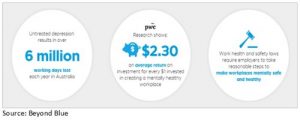Business of managing employee engagement, well-being, performance
Samantha Young, Managing Director at Human Psychology, discusses the challenges with being a manager. One of the hardest transitions to make in a career is from doing the job to managing those doing the job, she writes. Samantha gave a presentation on this topic at the last School Law Conference series. Find more details about this month’s events School Law Summit 2019 and Workplace Investigations in Schools: Getting it Right.
 |
Employee engagement and wellbeing are core leadership challenges facing Australian organisations. Attracting and developing talent to leverage client relationships, create enduring value and maximise productivity and profitability has never been more important post-GFC as Australia attempts to restructure its economy.
The significant challenge for many organisations is in translating the sentiment around valuing “human capital” espoused by senior management to action by middle managers. In practice, too many managers are afraid to manage. They avoid difficult conversations with staff about workplace behaviour and performance. This leads to entrenched poor performance, employee malaise, micro-managing and fractured team spirit.
Managers are afraid to manage for complex and multi-factorial reasons: they have been promoted for their technical expertise and skills but are then not given the necessary training to be managers. They fear being accused of bullying and harassment or of saying the wrong thing and making a bad situation even worse. They feel unsupported by senior management if they initiate difficult conversations. They do not see it as their job. They have personality traits that make initiating difficult conversations problematic. They fear their under-developed skills will be revealed. The unwillingness of these managers, who should be leaders, to stand for fairness, quality output, employee growth, and mental health shows a gross lack of personal courage. They can’t or won’t connect.
One of the hardest transitions to make in a career is from doing the job to managing those doing the job. Letting go of the familiarity and reward of completing “hands on” tasks with predictable outcomes and control is difficult. A Harvard study found that 41% of the managers’ day were filled with activities that could be competently handled by others. The managers cling to tasks that make them feel busy and therefore important. Asking “Should I be doing this this task?” is confronting.
 |
Legally and ethically, talking to staff about issues such as mental illness and impact on job performance is a core leadership task. Employees crave timely constructive feedback and want to feel a sense of meaning and purpose in what they do at work as well as genuinely valued as people. If people really are our greatest asset, then we need to treat them as such, because not all of our people are great assets and some need to be managed. Great people need to feel appreciated, motivated and cared for. Great managers make it easy for their team to do their jobs. This requires having difficult conversations on a regular basis if workplace behaviours don’t align with expectation.
Some company cultures tolerate managers’ moving problematic staff from department to department, rather than try to address the behaviour. By the time they get to you, they’ve been with the company for so long that it now seems impossible to commence dealing with their conduct. You’re tempted to follow the lead of your predecessors and simply shuffle the issue along to the next team and move around the misery. This is no longer acceptable management practice and does not provide dignity or respect to staff.
Last century, managers managed and workers worked. In the 21st Century, too many managers are clinging to this old command and control model or are paralysed with confusion, not sure what they stand for and scared to make decisions or have meaningful conversations. Giving your staff an anonymous survey will not tell you what they are really thinking, but cultivating trust and engagement through consistent interaction will.
Modern managers need to lead and manage simultaneously and leadership is an act of service, not a title. When you are authentic and speak your mind and let people be responsible for how they deal with your truth, good things generally tend to happen. Say what you mean and mean what you say. The conversation is the relationship and successful management in the 21st Century will come down to genuinely treating people as our greatest asset. Perhaps it always has.
Samanthan Young M.Psych. (Clin.), M.B.A, B.A. (Hons.), MAPS, GAICD, is the Managing Director of Human Psychology. Samantha brings a unique combination of senior management and commercial experience, psychological intervention skills and Masters-level formal education in both business and psychology to her clinical, training, coaching and consulting work. She has led large teams, advised CEOs and Boards on strategic issues and routinely provides consulting advice to private and public sector organisations on complex human resource matters, learning and development and leadership coaching and assessment. Samantha has worked as a Consultant with Boston Consulting Group, Sales & Marketing Manager for The Body Shop and Strategy Manager for Myer GraceBros.
Samantha holds Bachelor and Postgraduate qualifications in business and psychology, including a Master Degree in Clinical Psychology and an MBA from Melbourne University. Samantha has completed the Company Director’s Course and is a member of the Australian Psychological Society. Samantha is passionate about helping people to think, feel and perform better at individual, team and organisational levels. She is Managing Director for Human Psychology, one of Adelaide’s largest psychological services providers with a team of 20 people operating for over 10 years. Human Psychology’s mission is to help organisations and their people to embrace 21st century change by enhancing their self-awareness, building stronger and more cohesive relationships, increasing engagement, developing resilience and most importantly, caring for themselves and others. Contact Samantha at syoung@humanpsychology.com.au or connect via LinkedIn You can also connect with Human Psychology via Facebook.